With more than 31,000 dead in Brazil and more than 10,000 dead in Mexico, the novel coronavirus epidemic threatens to shatter hospital systems across Latin America.
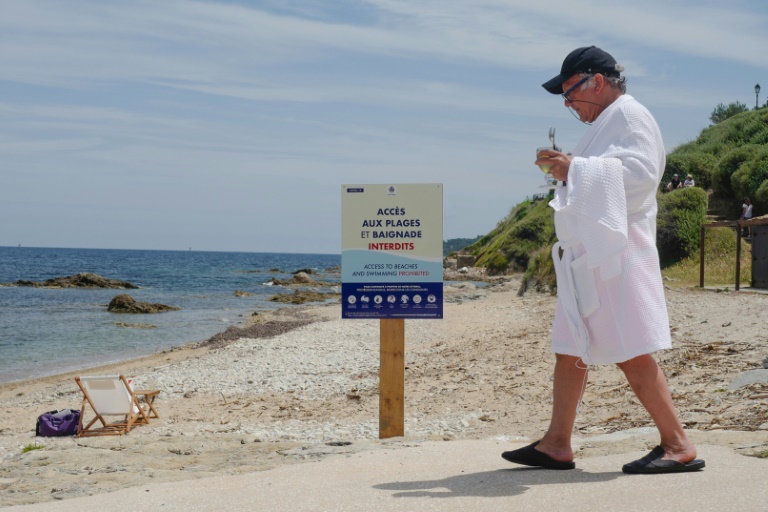
France is among the countries easing lockdown restrictions. /AFP
France is among the countries easing lockdown restrictions. /AFP
Four of the 10 countries showing the greatest number of new COVID-19 cases over the last 24 hours were in Latin America, the World Health Organization's emergencies director Michael Ryan said.
The pandemic has now killed more than 377,000 people and infected at least 6.3 million. Efforts to halt its spread by imposing restrictions on everyday life have plunged economies into recession.
However in Europe, schools, pools, pubs and tourist sites have begun to open, defying warnings that this could trigger a second wave of infections.
The United States, where the pandemic has been overshadowed by unrest following the death of a black man at the hands of a white police officer, remains by far the worst-affected country.
The World Health Organization's regional director for the Americas urged the U.S. on Tuesday to keep helping countries in the region to fight the novel coronavirus even as the Trump administration leaves the UN agency.
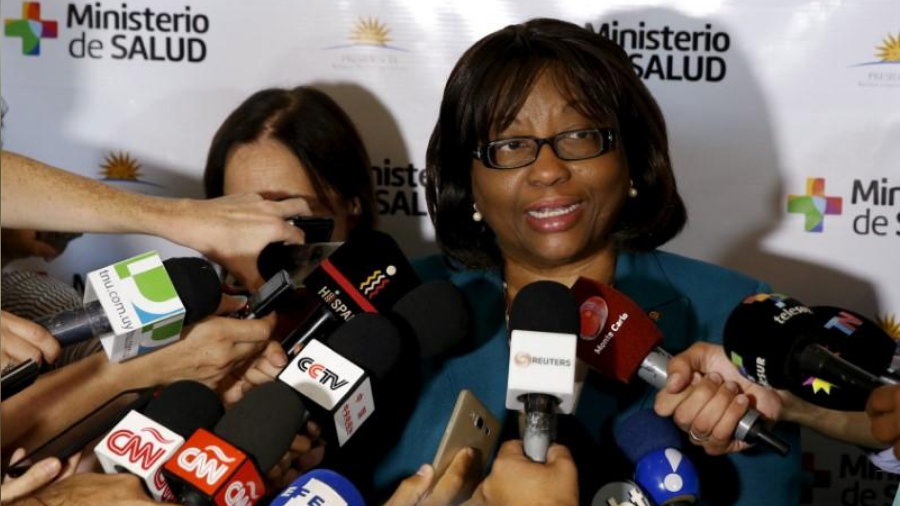
Director of the Pan American Health Organization Carissa Etienne speaks to the media during a meeting of Public Health ministers of the Mercosur trade block in Montevideo, February 3, 2016. /Reuters
Director of the Pan American Health Organization Carissa Etienne speaks to the media during a meeting of Public Health ministers of the Mercosur trade block in Montevideo, February 3, 2016. /Reuters
She said in a virtual briefing that the U.S provides 60 percent of the WHO's regional branch, the Washington-based Pan American Health Organization (PAHO), which she heads. U.S. President Donald Trump said on Friday that he was cutting ties with the WHO, accusing it of becoming a puppet of China. The WHO has denied Trump's assertions that it promoted Chinese "disinformation" about the virus.
The novel coronavirus cases are spreading quickly in Latina America. Brazil, Peru, Chile and Mexico are experiencing the largest daily increases, and numbers are on the rise also in Argentina, Bolivia, Colombia, and Haiti.
PAHO directors on the call advised Latin American governments not to open their economies too fast and to avoid public crowds especially where coronavirus cases are still increasing, such as in Brazil, which has the second worst outbreak in the world after the United States.
"Countries are having to work very, very hard to both understand the scale of infection but also health systems are beginning to come under pressure across the region," said Ryan, speaking at a virtual press conference from Geneva. He expressed particular concern for Haiti.
Latin America has passed one million cases and recorded more than 50,000 deaths. Brazil has reported more than half of those cases and close to 60 percent of the fatalities.
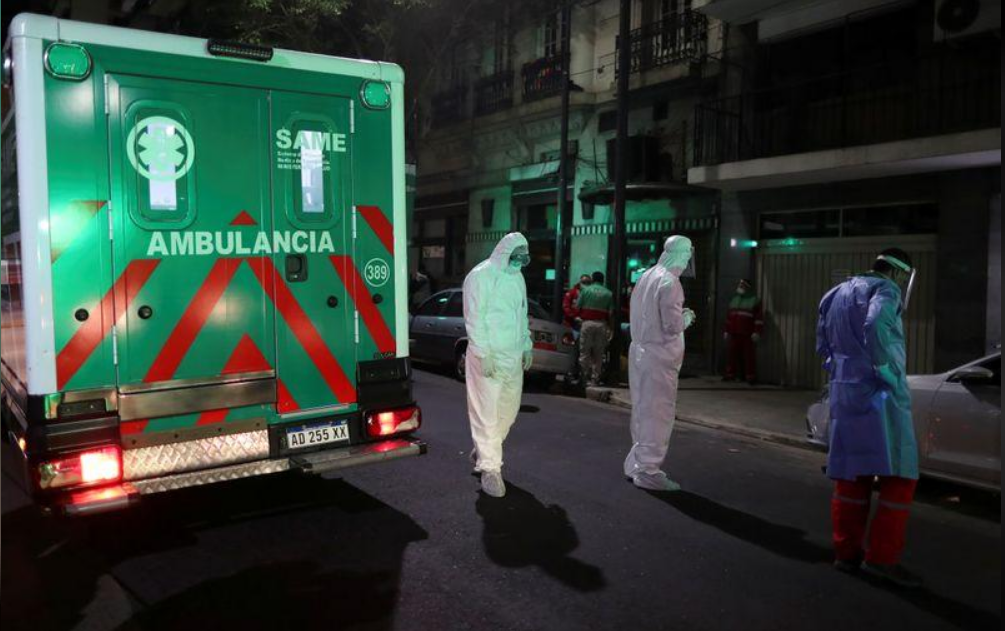
Healthcare workers are seen outside a geriatric facility after several cases were confirmed there, during the spread of the coronavirus disease, in Buenos Aires, Argentina, May 7, 2020. /Reuters
Healthcare workers are seen outside a geriatric facility after several cases were confirmed there, during the spread of the coronavirus disease, in Buenos Aires, Argentina, May 7, 2020. /Reuters
Even so, the mayor of Rio de Janeiro announced Monday that the popular tourist city would begin to gradually ease lockdown measures starting Tuesday, beginning with the reopening of places of worship and water sports.
Mexico also began reopening on Monday, reactivating the automotive industry, mining and construction even though the country has recorded more than virus 10,000 deaths, second only to Brazil in Latin America.
Ryan warned that the region is not out of danger yet. Central and South America in particular had very much become the intense zones for transmission of this virus, he said, adding that they hadn't reached the peak in the transmission, and no one could predict when it would come.
Britain moving too soon?
In Europe, from Russia to France, Italy and Britain, countries have started to emerge from months-long lockdowns, cautiously adopting a post-pandemic version of normal. Bars began to serve again in Finland and Norway with distancing restrictions or shortened hours in place, while some schools in Britain and Greece opened their doors again.
Britain reported 111 more virus deaths on Monday, the lowest daily toll since the lockdown started on March 23. But critics of British Prime Minister Boris Johnson's government said it is moving too soon.
"COVID-19 spreading too fast to lift lockdown in England," scientific advisor Jeremy Farrar said on Twitter.
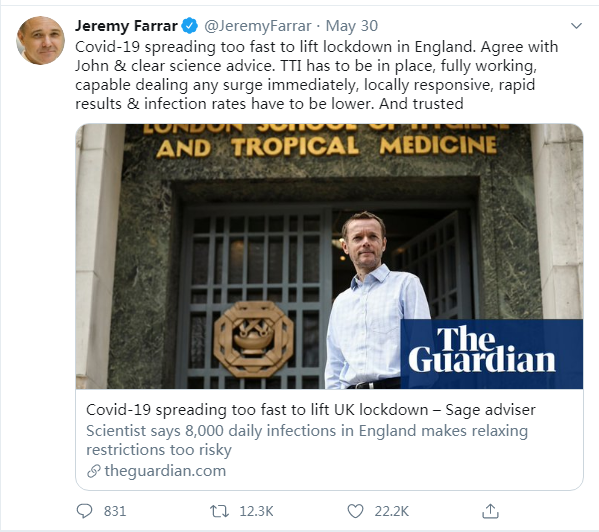
Btitish scientific advisor Jeremy Farrar tweets "COVID-19 spreading too fast to lift lockdown in England." /CGTN Screenshot
Btitish scientific advisor Jeremy Farrar tweets "COVID-19 spreading too fast to lift lockdown in England." /CGTN Screenshot
In Russia, Moscow shopping malls and parks reopened on Monday even though the country ranks third in the world in new daily cases. Shopkeepers were eager to see business pick up again.
Russia's President Vladimir Putin meanwhile called Armenia's Prime Minister Nikol Pashinyan to wish him a speedy recovery, as he became the latest leader to test positive for the virus.
Colosseum reopened
Greece opened some hotels, schools, pools and tattoo parlors, while in Slovenia a mandatory rule to wear masks was eased as the country declared the end of the outbreak.
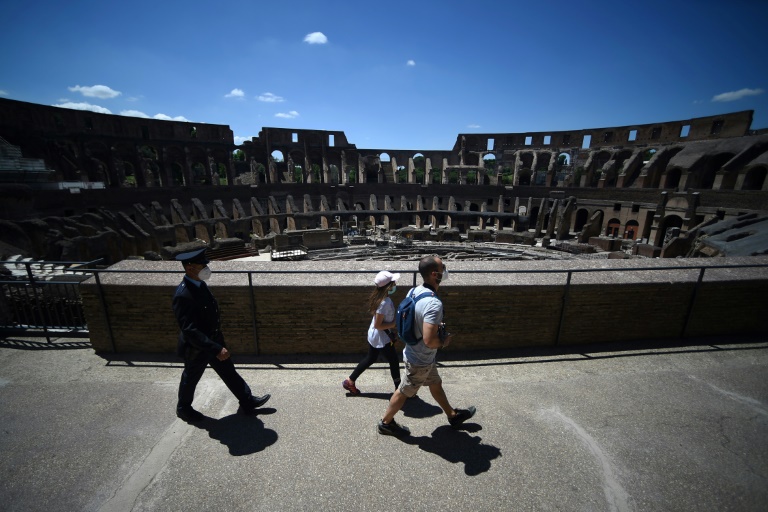
Rome's famed Colosseum reopened to Italian nationals, but foreign tourists were still banned. /AFP
Rome's famed Colosseum reopened to Italian nationals, but foreign tourists were still banned. /AFP
In Romania, Bucharest's Grigore Antipa Natural History Museum reopened, as did Rome's famed Colosseum, although only to Italians. The latest official figures from Italy were encouraging: over the last 24 hours there were 178 new cases and 60 deaths, continuing a downward trend.
There was also good news from Spain, another country badly hit by the virus: on Monday it recorded its first 24-hour period without a COVID-19 death since March 3.
France registered 31 deaths over the last 24 hours, a day before it was due to reopen cafes, restaurants and bistros, closed since the lockdown began on March 17.
In South Africa, scores of joyous people blasting music queued outside liquor stores in the Johannesburg township of Soweto, waiting to stock up after a nine-week ban on alcohol sales ended.
"We are overwhelmed, over the moon, so excited. This place is jamming," said one customer, Bongani Khumalo. Health Minister Zweli Mkhize pleaded with citizens not to "panic-buy" and to "reduce consumption."
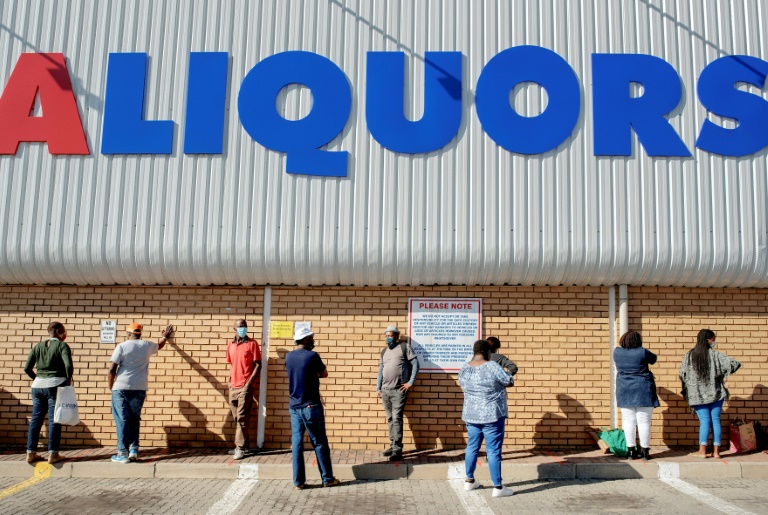
Drinkers queued up in South Africa as an alcohol ban was lifted. /AFP
Drinkers queued up in South Africa as an alcohol ban was lifted. /AFP
Fresh Ebola outbreak
The pandemic has devastated the global economy, which is facing the worst downturn since the Great Depression of the 1930s.
With businesses and citizens growing tired of confinement, pressure is building on national leaders to end the lockdowns, especially in countries where the outbreak appears to be slowing.
But health experts continue to warn of a possible second wave of infections if authorities and citizens let their guard down. In America, Washington and Los Angeles resumed outdoor dining, while New York City is on track to begin reopening from June 8. The U.S. now recorded almost 107,000 novel coronavirus deaths, and over 1.8 virus million cases.
The WHO insists it wants to keep working with U.S. authorities despite President Donald Trump's decision last week to cut ties with the organization.
Meanwhile, in the Democratic Republic of Congo, there was a reminder that the threat of other deadly infections continues. The health ministry reported a fresh outbreak of Ebola in the northwest region of the huge central African country.
(With input from Reuters and AFP)